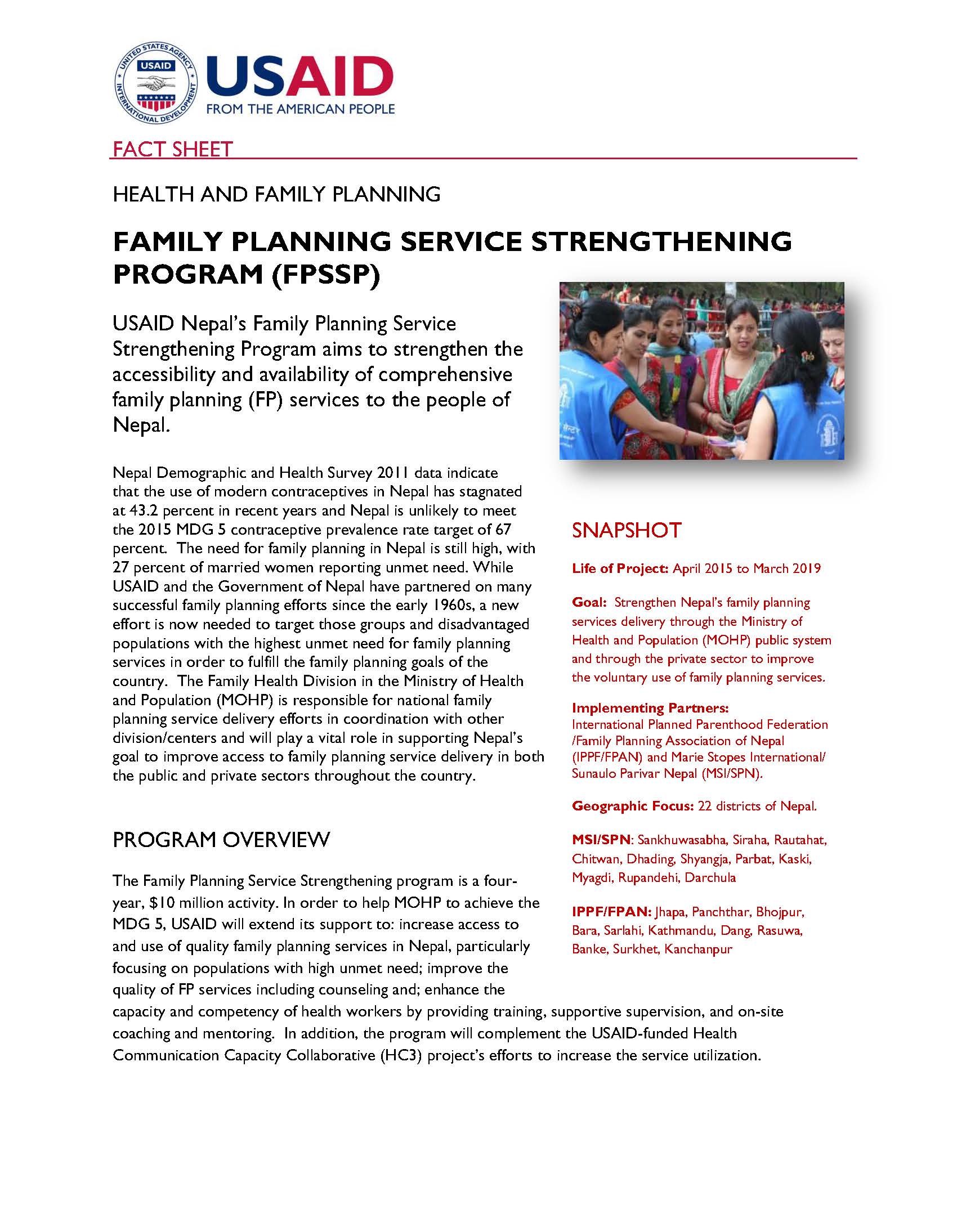USAID Nepal’s Family Planning Service Strengthening Program aims to strengthen the accessibility and availability of comprehensive family planning (FP) services to the people of Nepal.
Nepal Demographic and Health Survey 2011 data indicate that the use of modern contraceptives in Nepal has stagnated at 43.2 percent in recent years and Nepal is unlikely to meet the 2015 MDG 5 contraceptive prevalence rate target of 67 percent. The need for family planning in Nepal is still high, with 27 percent of married women reporting unmet need. While USAID and the Government of Nepal have partnered on many successful family planning efforts since the early 1960s, a new effort is now needed to target those groups and disadvantaged populations with the highest unmet need for family planning services in order to fulfill the family planning goals of the country. The Family Health Division in the Ministry of Health and Population (MOHP) is responsible for national family planning service delivery efforts in coordination with other division/centers and will play a vital role in supporting Nepal’s goal to improve access to family planning service delivery in both the public and private sectors throughout the country.
PROGRAM OVERVIEW
The Family Planning Service Strengthening program is a four-year, $10 million activity. In order to help MOHP to achieve the MDG 5, USAID will extend its support to: increase access to and use of quality family planning services in Nepal, particularly focusing on populations with high unmet need; improve the quality of FP services including counseling and; enhance the capacity and competency of health workers by providing training, supportive supervision, and on-site coaching and mentoring. In addition, the program will complement the USAID-funded Health Communication Capacity Collaborative (HC3) project’s efforts to increase the service utilization.
The program is expected to deliver results in five areas
- Expand and strengthen clinics in selected district hospitals, Primary Health Care Centers, Health Posts and health facilities with birthing centers focusing on ensuring availability of a full range of methods including long acting reversible and permanent methods all year round and reaching eligible populations with high unmet need;
- Expand and strengthen comprehensive (all methods) family planning services at Voluntary Surgical Contraception (VSC) services sites all year round;
- Expand and strengthen outreach/satellite clinics and mobile comprehensive (all methods) including VSC services focusing on hard-to-reach/marginalized/disadvantaged groups;
- Support MOHP to increase availability of all five family planning methods at health facilities; and
- Strengthen the capacity of health workers for better counseling skills, task shifting and skill transfer.
PROGRAM ACTIVITIES
- Competency-based training to government health workers for Intrauterine Contraceptive Devices, Implant, Non-Scalpel Vasectomy and Minilaparotomy.
- Family planning counseling training to improve interpersonal communication.
- District capacity building including technical and logistic support.
- Post-training follow up, coaching and mentoring.
- Comprehensive service provision including postpartum FP through static, satellite, and outreach clinics and health facilities.
- Social Behavior Change Communications through street drama, radio, IPC and TV programs.
- Data quality assurance including Logistic Management Information System and Health Management Information System.
KEY RESULTS
- Increased availability of quality family planning services at clinics, Voluntary Surgical Contraception Service sites, outreach/satellite clinics, and mobile camps.
- Increased availability of five different family planning methods at each health facility.
- Increased capacity of health workers to deliver quality, comprehensive family planning services.








Comment
Make a general inquiry or suggest an improvement.